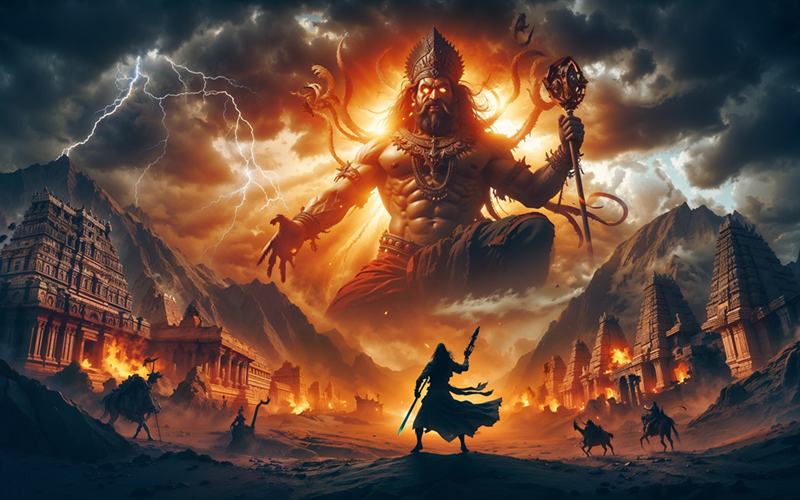Physical Address
Empirical System, 105 First Floor Pitru Krupa, Opp. R.K. Desai College, Koparli Road, Vapi (Gujarat) 396 191
Physical Address
Empirical System, 105 First Floor Pitru Krupa, Opp. R.K. Desai College, Koparli Road, Vapi (Gujarat) 396 191

Ravana’s ambition was fueled by the extraordinary boons he received from Lord Brahma and Lord Shiva. After performing severe penances (tapasya) for many years, Ravana pleased Brahma, who granted him a boon that he could not be killed by gods, demons, or spirits. In his arrogance, Ravana did not ask for protection against humans or animals, considering them too weak to pose any threat to him.
Ravana also performed penance to please Lord Shiva, as mentioned earlier, and gained invincible strength, divine weapons, and mastery over many forms of magic and sorcery. These boons made Ravana almost invincible, and his power and confidence grew immensely.
With his newfound power, Ravana set his sights on conquering the three worlds—Heaven (Svarga), Earth (Prithvi), and the Netherworld (Patala). Ravana’s conquests began on Earth, where he waged wars against powerful kings and rulers. His ten heads and twenty arms struck terror in the hearts of his enemies, and he easily subdued many kingdoms.
Ravana then turned his attention to the heavens. He led an army of Rakshasas to invade Amaravati, the capital of Indra, the king of the gods. Ravana defeated Indra in battle, capturing him and humiliating the gods. Indra was later released due to the intervention of Brahma, but the defeat left a lasting mark on the gods, who feared Ravana’s growing power.
Ravana’s dominion extended to the Netherworld as well, where he subjugated various powerful beings. His conquests made him the supreme ruler of the three worlds, with even the gods fearing his might.
Ravana’s path to becoming the ruler of Lanka (Lankesh) began with his conquest of the city itself. Lanka was originally ruled by his half-brother Kubera, the god of wealth and the son of Vishrava from his first wife, Ilavida. Lanka was a magnificent city, said to have been built by Vishwakarma, the divine architect. The city was adorned with palaces made of gold, precious gems, and other luxurious materials. It was known for its immense prosperity and splendor, surrounded by impregnable fortifications and guarded by powerful Rakshasas loyal to Kubera.
Kubera ruled Lanka with fairness and prosperity, and the city was a hub of trade and culture. However, Ravana’s greed and ambition led him to desire the city for himself.
Driven by his desire for power, Ravana decided to challenge Kubera and attacked Lanka. After a decisive battle, Ravana defeated Kubera and took possession of Lanka, declaring himself Lankesh, the ruler of Lanka. Kubera was forced to flee the city, leaving behind his wealth and the famed Pushpaka Vimana, a flying chariot that could travel at the speed of thought. Ravana claimed the Pushpaka Vimana and used it as a symbol of his newfound power and status as Lankesh.
As Lankesh, Ravana established a reign characterized by both terror and prosperity. Despite his demonic lineage and fierce persona, Ravana was a devout follower of Lord Shiva and a learned scholar of the Vedas. His kingdom of Lanka flourished under his rule, becoming one of the most prosperous and well-defended cities in the world.
Lanka was described as a city of unparalleled wealth and beauty. The streets were lined with golden statues, and the palaces were decorated with precious gems. Ravana ensured that Lanka was not only a place of luxury but also a formidable fortress. He surrounded the city with high walls and stationed powerful Rakshasas to guard its gates.
However, Ravana’s arrogance and unchecked ambition eventually led to his downfall. His belief in his own invincibility made him reckless, culminating in his abduction of Sita, the wife of Lord Rama. This act set in motion the events of the Ramayana, ultimately leading to Ravana’s demise at the hands of Rama, who was an incarnation of Lord Vishnu.